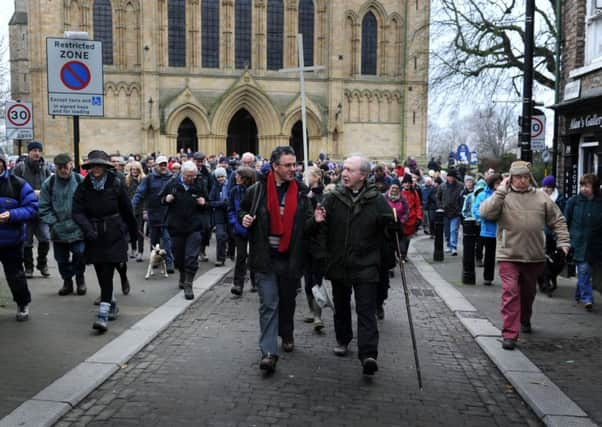Bishop James Bell: Signs of hope for Yorkshire's rural churches


The challenges are great, but the rural Church has a great story to tell of faithfulness and service and is already demonstrating the potential for exciting renewal and significant growth.
There are plenty of examples across the Diocese of Leeds of fresh expressions of church, enabling people to engage with the Christian faith and values in lively, relaxed and contextually responsive ways – like Forest Church in Swaledale, messy churches in a number of places, thriving café churches, a pub church in Clapham, and a pop-up church in Markington.
Advertisement
Hide AdAdvertisement
Hide AdAlong with significant mid-week services and collective worship in schools, “Church” is showing up far more than on the traditional Sunday morning.
Many stories can be told of our new developments to serve the common good – buildings adapted to become community assets through the week as well as on Sunday; community lunches to mitigate isolation, computer cafés to help education and all this alongside the commitment to maintain as many church schools as possible in rural communities.
Yet Sundays are still important as a day for worship and here too there are many signs of vision and energy in popular all age services, family worship and all the seasonal offerings.
One major challenge presented by multi-church benefices in the care of one vicar is to continue to offer regular Sunday worship in parish churches.
Advertisement
Hide AdAdvertisement
Hide AdSince the special calling of the Church of England is to be the church of the parish and for the parish. So, in my episcopal area of Ripon, we have developed a lay worship leaders’ training programme with the vision of holding a service in every church every Sunday.
Experience suggests that where this happens, numbers increase. It is also proving to be a seed bed for vocations to reader and ordained ministries. The Church can only fulfil its aspiration to be a Christian presence in every place by increasing collaboration with our ecumenical partners and by becoming a church with an every-member ministry.
This is simply to recover the vision of what the church is meant to be, which is the body of Christ. Every member with a gift, a grace, a talent to offer to fulfil the calling to be Christ in the world.
The role of the laity is therefore going to continue to change at a greater pace. The role of the clergy will also change.
Advertisement
Hide AdAdvertisement
Hide AdOne of the main roles of the clergy will be to enable the body to function by discerning and releasing the gifts that are in the people of the Church and beyond the Church, and offering supervision and support in the use of those gifts.
There are already movements in this direction with the lay worship leaders programme and with a course such as Step Up, in which clergy identify people ready to take greater responsibility and offer them a year growing in their following of Jesus Christ.
All this means that clergy need to get even better at working with others for a common purpose and working well together. Nothing drains energy like isolation and nothing stimulates the imagination and energises them like working together and praying together and encouraging one another.
The greatest challenge remains, which is to communicate more effectively the “faith the Church is called upon to proclaim afresh in each generation”.
Advertisement
Hide AdAdvertisement
Hide AdCapturing the imagination with something which isn’t about rules and ritual but about life in abundance is the heart of the matter.
We aren’t just about religion but about living well, living with God, and seeking human flourishing in every place.
The rural church makes up two-thirds of Church of England parishes and 40 per cent of worshippers, so is a major part of the whole Church.
Given that a greater proportion of the rural population associate with Church one way or another than in cities and suburbs, it is also remarkably well placed to touch lives for good and to spark the imagination with faith.
Advertisement
Hide AdAdvertisement
Hide AdThe theme “Telling a new story:” emerged strongly during the Church of England’s General Synod debate on the highly acclaimed report Released for Mission in February 2015.
This and subsequent research has indicated that the narrative of the rural Church is far from one of decline and failure, but one offering signs of new life and hope for the future.
Bishop James Bell retired from his role as Bishop of Ripon in the Anglican Diocese of Leeds on Sunday, after 13 years in the post.